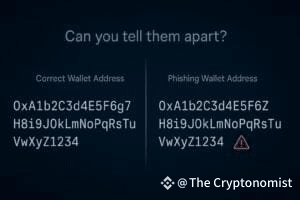
A prominent crypto investor recently lost $3 million in USDT in a phishing attack that exploited a common user mistake in how people verify wallet addresses.
This type of crypto wallet scam has become increasingly common, with millions lost in similar incidents in 2024 alone. It highlights the need for users to better understand the risks associated with DeFi wallet scams and take proactive steps to secure their crypto wallets.
What Happened: A Wallet Address Trick
The attacker created a malicious smart contract and disguised its address to look nearly identical to the correct wallet address, matching the first and last characters.
Wallet addresses in Ethereum and many other blockchains are long hexadecimal strings, often 42 characters, that uniquely identify accounts or contracts.
When the victim signed the transaction, the funds were instantly drained. The scam relied on the assumption that most users only glance at the beginning and end of a wallet address when verifying transactions.
This wasn’t a traditional hack. The victim didn’t share a password or private key. Instead, they unknowingly granted permission for a contract to move funds. Once approved, the attacker simply waited for the right moment to drain the account.
This type of scam (known as address spoofing or a homoglyph attack) is subtle but devastating, and it bypasses many users’ usual security instincts. It doesn’t rely on brute force or malware, just misplaced trust and a moment of carelessness.
How to Secure Your Crypto Wallet
Whether you’re using an ERC20 wallet or a mobile-based wallet, these best practices can help reduce your risk:
Always verify the full wallet address before signing transactions. Don’t rely on just the first and last few characters.
Revoke smart contract approvals you no longer use by visiting trusted token permission management sites like Etherscan Token Approval Checker. This tool allows you to see and revoke permissions granted to smart contracts, limiting their access to your tokens.
Be cautious when connecting your DeFi wallet to unfamiliar dApps or platforms. Double-check URLs, and only interact with verified or well-reviewed projects.
Regularly monitor your wallet for any unknown contract interactions.
Crypto Wallet Adoption Continues to Grow
This $3M loss is a painful reminder that even experienced users can fall victim to clever DeFi wallet scams. As adoption of crypto wallets grows, so does the creativity of attackers.
If you’re just learning how to get a crypto wallet, or wondering how to send Bitcoin to another wallet, take time to also learn how to secure your crypto wallet.
Security doesn’t stop after setup, stay one step ahead by regularly reviewing your permissions and learning how to spot common scams.
Best Crypto Wallet With Strong Security
Beyond user awareness on how to stay vigilant, there’s also a growing need for wallets with rock-solid security architecture that can safeguard assets even in the face of evolving phishing threats.

That’s exactly where Best Wallet steps in! A no-KYC wallet designed not just for storage, but for optimizing every corner of a crypto portfolio, Best Wallet strikes a better balance between security, privacy, and functionality, making it an ideal option for everyday investors in 2025.
Best Wallet is built with security at its core, providing a strong line of defense against in a market full of risks. It’s fully self-custodial, meaning users control their private keys directly with no middlemen, no KYC hurdles, and no email-based attack vectors.
The Web3 wallet also integrates Fireblocks, an advanced security technology that splits private keys into multiple encrypted parts across separate parties, eliminating any single point of failure that attackers can exploit. There are also built-in scam filters that automatically detect suspicious or spam tokens.
Even fiat on-ramps are secured, owing to its integration of trusted providers like MoonPay and Alchemy Pay, avoiding shady third-party redirects. Similarly, key features like biometric login, optional two-factor authentication, and thorough encryption add an extra layer of protection to user assets.
But security is only part of the appeal. Best Wallet also empowers users with a full suite of trading features that can help them maximize the ongoing bull market. Its support for multiple chains, including Bitcoin, Ethereum, Polygon, Binance Smart Chain, Solana, and Base ensures users can store, buy, and trade thousands of cryptocurrencies, all within a single app.
Cross-chain swaps are available as well, thanks to its integration of over 300 decentralized protocols and more than 30 cross-chain bridges, ensuring users get the market rates for their trades.
What also makes Best Wallet particularly useful is its “Upcoming Tokens” screener, a discovery tool designed to scan the market, analyze potential, and highlight promising early-stage opportunities. But beyond listing, this tool also allows users to buy these assets without navigating multiple interfaces.
It is not without reason that the wallet has amassed over 500,000 users within a short timeframe, with analysts tipping it to capture at least 40% of the total crypto wallet market share by 2026. Therefore, for those looking for a fully secure crypto trading experience with advanced features, Best Wallet is a powerhouse worth considering.
Download Best Wallet
This article has been provided by one of our commercial partners and does not reflect Cryptonomist’s opinion. Please be aware our commercial partners may use affiliate programs to generate revenues through the links on this article.

